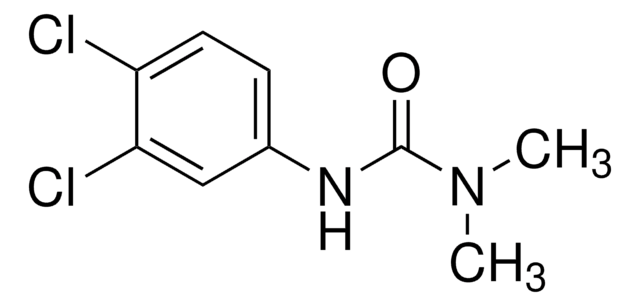271993
2,5-Dibromo-6-isopropyl-3-methyl-1,4-benzoquinone
Sinónimos:
2,5-Dibromo-3-methyl-6-isopropyl-p-benzoquinone, Dibromothymoquinone
Iniciar sesiónpara Ver la Fijación de precios por contrato y de la organización
About This Item
Fórmula lineal:
(CH3)2CHC6Br2(CH3)(=O)2
Número de CAS:
Peso molecular:
321.99
EC Number:
MDL number:
UNSPSC Code:
12171500
PubChem Substance ID:
NACRES:
NA.47
Productos recomendados
form
powder, crystals or chunks
Quality Level
mp
70-72 °C (lit.)
application(s)
diagnostic assay manufacturing
hematology
histology
storage temp.
room temp
SMILES string
CC(C)C1=C(Br)C(=O)C(C)=C(Br)C1=O
InChI
1S/C10H10Br2O2/c1-4(2)6-8(12)9(13)5(3)7(11)10(6)14/h4H,1-3H3
InChI key
GHHZELQYJPWSMG-UHFFFAOYSA-N
Categorías relacionadas
Application
2, 5-Dibromo-6-isopropyl-3-methyl-1, 4-benzoquinone has been used as a metabolic inhibitor of violaxanthin (V) cycle of Pelvetia canaliculata and is used as a photosynthetic electron transport chain (pETC) inhibitor.
Biochem/physiol Actions
2, 5-Dibromo-6-isopropyl-3-methyl-1, 4-benzoquinone acts as an inhibitor of respiratory and photosynthetic processes.
Storage Class
11 - Combustible Solids
wgk_germany
WGK 3
flash_point_f
Not applicable
flash_point_c
Not applicable
ppe
dust mask type N95 (US), Eyeshields, Gloves
Elija entre una de las versiones más recientes:
¿Ya tiene este producto?
Encuentre la documentación para los productos que ha comprado recientemente en la Biblioteca de documentos.
Jemaa Essemine et al.
Frontiers in plant science, 11, 1009-1009 (2020-08-01)
The present study reveals contrasting responses of photosynthesis to salt stress in two C4 species: a glycophyte Setaria viridis (SV) and a halophyte Spartina alterniflora (SA). Specifically, the effect of short-term salt stress treatment on the photosynthetic CO2 uptake and
Activation of violaxanthin cycle in darkness is a common response to different abiotic stresses: a case study in Pelvetia canaliculata
Marin BF<
BMC plant biology (2011)
The KaiA protein of the cyanobacterial circadian oscillator is modulated by a redox-active cofactor.
Thammajun L Wood et al.
Proceedings of the National Academy of Sciences of the United States of America, 107(13), 5804-5809 (2010-03-17)
The circadian rhythms exhibited in the cyanobacterium Synechococcus elongatus are generated by an oscillator comprised of the proteins KaiA, KaiB, and KaiC. An external signal that commonly affects the circadian clock is light. Previously, we reported that the bacteriophytochrome-like protein
Chloroplasts extend stromules independently and in response to internal redox signals
Brunkard J O, et.al.
Proceedings of the National Academy of Sciences of the USA, 112, 10044-10049 (2015)
Gert Schansker et al.
Biochimica et biophysica acta, 1706(3), 250-261 (2005-02-08)
The effects of dibromothymoquinone (DBMIB) and methylviologen (MV) on the Chl a fluorescence induction transient (OJIP) were studied in vivo. Simultaneously measured 820-nm transmission kinetics were used to monitor electron flow through photosystem I (PSI). DBMIB inhibits the reoxidation of
Nuestro equipo de científicos tiene experiencia en todas las áreas de investigación: Ciencias de la vida, Ciencia de los materiales, Síntesis química, Cromatografía, Analítica y muchas otras.
Póngase en contacto con el Servicio técnico







